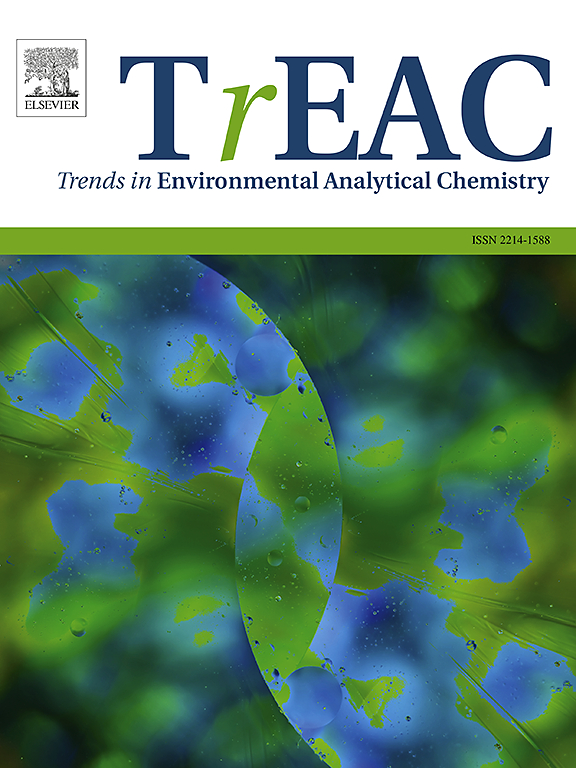评估环境基质和微塑料中的欧洲观察清单污染物:分析策略、吸附机制和发生机制
IF 13.4
2区 化学
Q1 CHEMISTRY, ANALYTICAL
引用次数: 0
摘要
欧盟要求进行环境监测,以确定涉嫌造成不良影响的潜在污染物,这些污染物不仅会影响水生生物,还会对人类健康造成直接和负面的影响。全面了解这些污染物在环境基质(包括微塑料)中的出现和影响,对于在知情的情况下决定是否将其列入监测清单至关重要。本研究的重点是审查和评估用于确定最近第四批欧洲监控清单所列物质的分析方法,这些物质存在于各种环境基质中,包括水、土壤、生物群和微塑料。此外,还讨论了微塑料吸附的不同相互作用机制。还专门用一个章节来研究这些物质在不同环境基质中的出现情况。研究结果有助于更好地了解这些物质的存在和影响,有助于制定有效的监控策略,减轻它们对环境的影响。本文章由计算机程序翻译,如有差异,请以英文原文为准。
Evaluation of European watch list contaminants in environmental matrices and microplastics: Analytical strategies, mechanisms of adsorption and occurrence
The European Union requires environmental monitoring to identify potential pollutants suspected of causing adverse effects, affecting not only aquatic organisms but also posing direct and negatively influence to human health. Comprehensive knowledge about their occurrence and impact of these pollutants in environmental matrices, including microplastics, is essential for informed decision regarding their inclusion in surveillance lists. This study focuses on reviewing and assessing the analytical methodologies employed in determine substances listed in the last 4th European Watch List, in various environmental matrices, including water, soils, biota, and microplastics. Additionally, the different interaction mechanisms of adsorption onto microplastics are discussed. A dedicated section is also addressed to examine the occurrence of these substances in diverse environmental matrices. The findings contribute to a better understanding of the presence and effects of these substances, aiding in the development of effective surveillance strategies to mitigate their impact on the environment.
求助全文
通过发布文献求助,成功后即可免费获取论文全文。
去求助
来源期刊

Trends in Environmental Analytical Chemistry
Chemistry-Analytical Chemistry
CiteScore
21.20
自引率
2.70%
发文量
34
审稿时长
44 days
期刊介绍:
Trends in Environmental Analytical Chemistry is an authoritative journal that focuses on the dynamic field of environmental analytical chemistry. It aims to deliver concise yet insightful overviews of the latest advancements in this field. By acquiring high-quality chemical data and effectively interpreting it, we can deepen our understanding of the environment. TrEAC is committed to keeping up with the fast-paced nature of environmental analytical chemistry by providing timely coverage of innovative analytical methods used in studying environmentally relevant substances and addressing related issues.
 求助内容:
求助内容: 应助结果提醒方式:
应助结果提醒方式:


